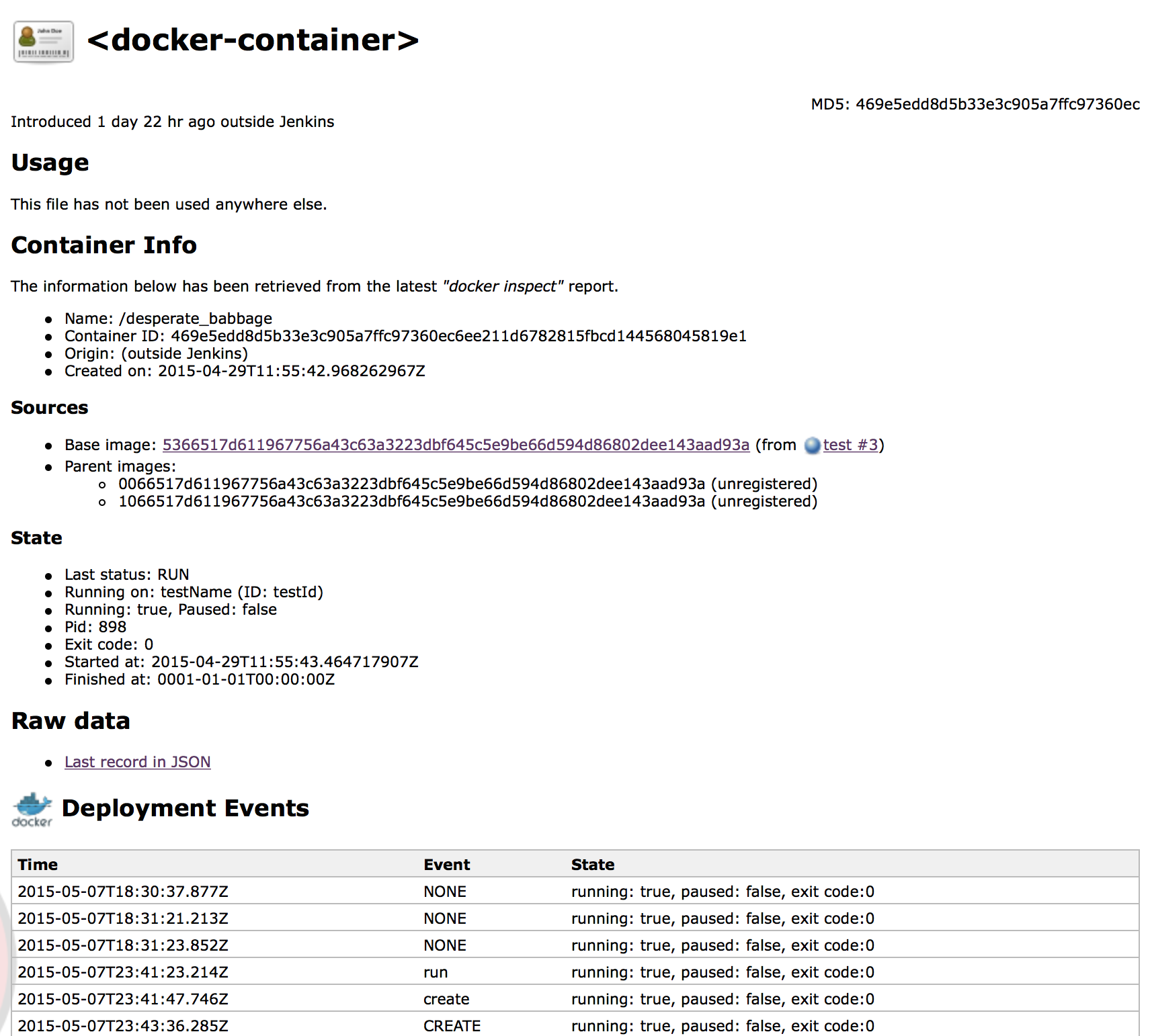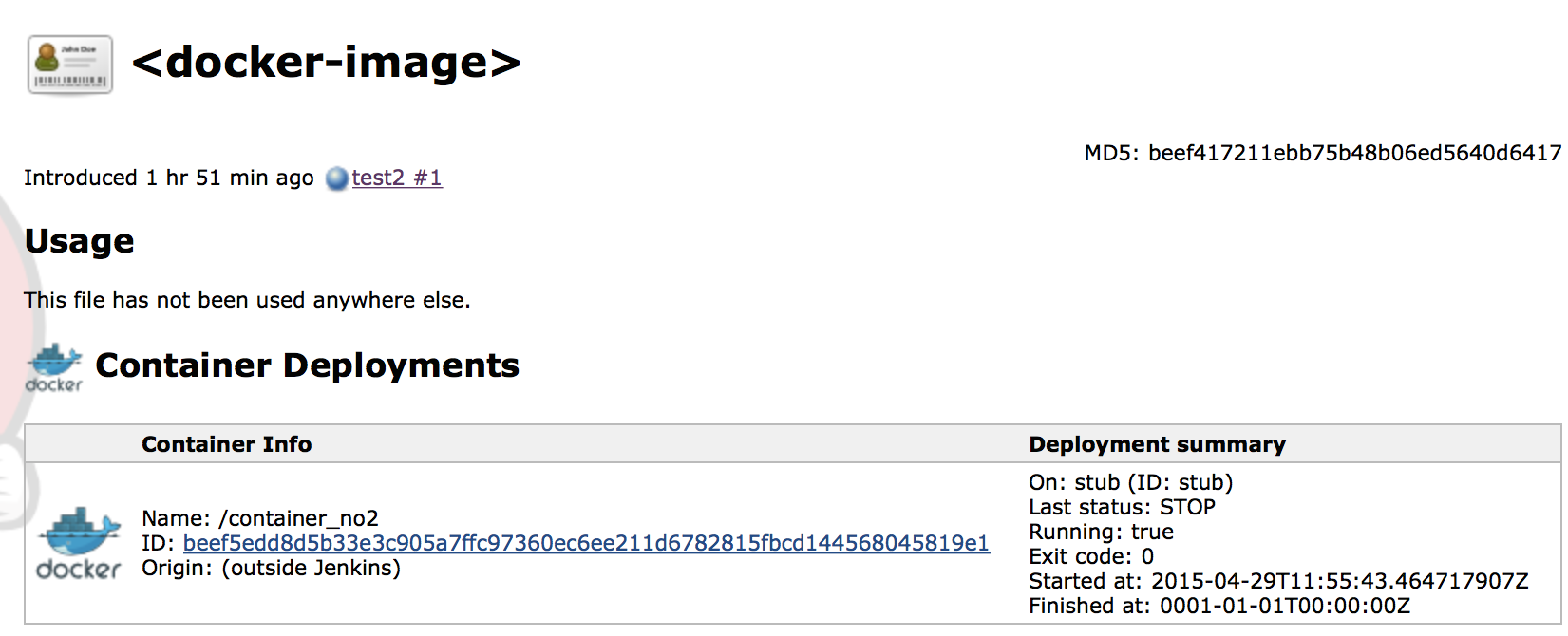This plugin allows the tracking of the creation and use of Docker containers in Jenkins and their future use.
Plugin Summary
-
Container deployments summary page
-
Tracking of Docker image and container deployments produced in Jenkins
-
Tracking of Docker container events
-
Tracking of Docker container states being retrieved from docker inspect calls
-
Advanced API for Docker reports analysis
-
Submission of events from Docker and Docker Swarm installations
-
Data polling from Jenkins (including Docker API-compatible JSONs)
-
Support of search queries

| The current version of the plugin has several limitations, which may affect common use cases. Refer to <<docker-traceability-errata> for more information. |
Installation guidelines
Plugin setup
-
Install the CloudBees Docker Traceability plugin from the Jenkins Update Center.
-
Install other Jenkins plugins, which produce image fingerprints to be traced by the plugin (refer to Integrations).
-
Configure security. This step is highly recommended, because the plugin can store raw JSON, which may contain sensitive information, such as passwords.
-
The plugin introduces new permissions, which allow to restrict the access
-
Read - Allows to retrieve details like full container/information dumps. Web interfaces are being managed by the global
Jenkins.Readpermission, so they won’t be affected -
Submit - Allows the submission deployment records from the remote API
-
Delete - Allows the deletion deployment records or entire fingerprints
-
-
It is recommended to restrict the access to the deployments records submission to a limited group of users
-
-
Optional: Edit plugin settings on the Jenkins configuration page to adjust the behavior. Main options are listed below:
-
Docker Traceability link on the dashboard
-
By default, Jenkins does not display the Docker Traceability link on the dashboard. After the link is enabled from the configuration page, select in the upper-right corner of the dashboard, and then select Docker Traceability to navigate to the Docker Traceability overview page.
-
Even if the root action is disabled, the plugin remains fully operational. The main action can be accessed using the direct
$JENKINS_URL/docker-traceabilitylink.
-
-
Image fingerprints creation mode
-
By default, the plugin expects image fingerprints to be created by other Docker plugins based on Docker Commons plugin.
-
The behavior can be adjusted on the plugin’s global configuration page
-
Client-side configuration
| The CloudBees team is working on a specialized fault-tolerant client, which will monitor events on Docker and Docker Swarm servers and then submit reports to Docker CloudBees Traceability plugin. This client will become available soon. Currently, the reports can be submitted using the plugin’s remote API commands. |
Use cases
Submit deployment records
The plugin does not support an automatic polling of events from external Docker servers. The events should be submitted by external clients or other Jenkins plugins.
| Currently, the plugin accepts the information for previously registered fingerprints only. Other submissions will be ignored. Initial image records should be created by other plugins using (Integrations) |
From external items using the REST API
The API provides several commands, which allow to submit new events from remote client applications.
If you use a secured instance, in addition to credentials clients must be aware about Cross-Site Request Forgery Protection on Jenkins. Otherwise,the requests may be rejected . Refer to the configuration guidelines on the Remote access API Wiki page.
submitContainerStatus is a simple call, which may be used from user scripts without a generation of additional JSON files.
Examples:
curl http://localhost:8080/jenkins/docker-traceability/submitContainerStatus --data-urlencode inspectData="$(docker inspect CONTAINER_ID)"
curl http://localhost:8080/jenkins/docker-traceability/submitContainerStatus --data-urlencode status=create --data-urlencode imageName=jenkinsci/workflow-demo --data-urlencode hostName=dev-server-1 --data-urlencode hostName=development --data-urlencode inspectData="$(docker inspect CONTAINER_ID)"
submitEvent is a more complex call, which allows you to submit all available data about a Docker container via a single REST API call. This call can be used from external plugins.
From other plugins
The plugin provides the DockerEventListener extension point, which is being used to notify listeners about new records.
Docker Traceability functionality also listens to these endpoints, so it is possible to notify the plugin about new records using DockerEventListener#fire()` method.
Get information from the plugin
For each container record the plugin publishes the information on the container summary page. A summary status about deployments is being also added to the parent image page.


If an external client submits information about the image (which can be retrieved using docker inspect imageId command), the plugin captures this image and adds a new facet to the image fingerprint page.

Raw data is accessible via the API or via hyperlinks on information pages.
Search
You can search deployments by container IDs using the "Search" control on the Docker Traceability page. You can also query containers using the API.
Integrations
CloudBees Docker Traceability plugin is based on fingerprints provided by Docker Commons plugin. The plugin just adds additional facets to main fingerprint pages, so any other plugin can contribute to the UI by adding additional facets to the fingerprint.
CloudBees CloudBees Docker Build and Publish plugin can create such fingerprints. Refer to Docker Commons plugin Wiki page for more information about other existing fingerprint contributors.
API
The detailed description of API endpoints is available in the "api" page of the Docker Traceability page (refer to $(JENKINS_URL)/docker-traceability/api)
Known issues
Below you can find a list of the issues, which may affect the plugin’s usage. CloudBees team is working on these issues in order to resolve them soon.
Fingerprints automatic cleanup by Jenkins (JENKINS-28655)
-
If the CloudBees Docker Traceability plugin creates a new container or image fingerprint from a client’s request, it cannot reference its original build due to the missing information
-
Jenkins has a garbage collector, which removes fingerprints without build references every 24 hours
Impact:
-
If the created fingerprint is not referenced by a build, it may be deleted within 24 hours
-
If any other plugin references a fingerprint during the build, it will be retained till the build gets deleted
Workaround:
-
You can disable the fingerprint cleanup thread from the
$JENKINS_HOME/init.groovyscript, which will be launched every time Jenkins starts up -
In such case Jenkins will retain all fingerprints, so be aware about possible disk overflows
-
Sample script:
import hudson.*; import hudson.model.*; ExtensionList.lookup(AsyncPeriodicWork.class).get(FingerprintCleanupThread.class).cancel()